News & Events in Belarus
2017 Top Events in Belarus

Digital economy and IT country
 Belarus President Alexander Lukashenko has set an ambitious goal to transform Belarus into an IT country.
Belarus President Alexander Lukashenko has set an ambitious goal to transform Belarus into an IT country.
“Belarus should become a real center of attraction for gifted people, successful companies, and international corporations. Our country has all the chances to become at least a regional leader in developing cutting-edge technologies: artificial intelligence, big data, and blockchain,” the Belarusian leader said.
Alexander Lukashenko signed a large-scale fundamental digital economy development ordinance on 22 December. The document is mainly designed to create the conditions for international IT companies to tap into Belarus, open branch offices and R&D centers in the country, and make products which are highly sought after in the world. Secondly, the ordinance is aimed at investment in the future: IT specialists and education. The third goal is to introduce cutting-edge financial instruments and technologies.
“The ordinance which was worked out on the president’s instruction really turns Belarus into one of the most comfortable places for IT business in the world. The document will produce a powerful positive effect not only on the IT sector but also on the whole Belarusian economy, and thus every Belarusian citizen,” said Director of Belarus’ Hi-Tech Park Vsevolod Yanchevsky.
Belarus may become an “IT Hong Kong” of Eastern Europe thanks to the new legislation, noted Viktor Prokopenya, founder of the investment company VP Capital.
Belarus’ international standing in the IT sector has considerably improved in the recent years, Huawei Technologies Product Manager Dmitry Polpudenko remarked. “The acquisition of Belarusian startups by such industry leaders as Google and Facebook testifies to the fact. If the world's largest players in the IT industry carry out transactions with Belarus, it means that the country has created the necessary conditions for the development of this sector. We can also speak about a good school of IT specialists, which proves there is a good education basis in the country,” he added.
Belarus has already achieved remarkable results in the IT industry. More than one billion people in 193 countries use mobile applications of Belarus’ Hi-Tech park resident companies. Over 90% of software developed in the Hi-Tech Park is exported to Russia, the CIS, Western Europe, and the USA.
Visa-free program for foreign citizens
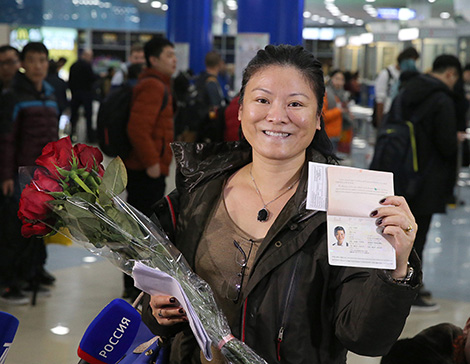 Belarus President Alexander Lukashenko signed Decree No. 8 “On the introduction of the visa-free entry and departure for foreign citizens” on 9 January 2017. The document launched a five-day visa-free entry program at the Minsk National Airport for 80 countries. The new regulations apply to 39 European countries, including the entire European Union, Brazil, Indonesia, the USA, Japan, and other countries.
Belarus President Alexander Lukashenko signed Decree No. 8 “On the introduction of the visa-free entry and departure for foreign citizens” on 9 January 2017. The document launched a five-day visa-free entry program at the Minsk National Airport for 80 countries. The new regulations apply to 39 European countries, including the entire European Union, Brazil, Indonesia, the USA, Japan, and other countries.
Belarus introduced its five-day visa-free travel on 12 February. As of 18 December 2017, over 76,500 foreign tourists from more than 70 countries visited Belarus visa-free. Most of them came from Germany. Belarus also welcomed numerous tourists from Poland, Italy, the USA, the UK, and other states.
Belarus is now working on extend the period of visa-free stay to ten days.
Decree No.462 on extending the visa-free time for foreign tourists to ten days in several areas in Brest Oblast and Grodno Oblast was signed on 26 December 2017. The decree will come into force on 1 January 2018.
Package of documents to develop entrepreneurship
 Belarus President Alexander Lukashenko signed Ordinance No. 7 “On entrepreneurship development”, a key document of the package of legal acts to improve the business environment in Belarus.
Belarus President Alexander Lukashenko signed Ordinance No. 7 “On entrepreneurship development”, a key document of the package of legal acts to improve the business environment in Belarus.
The ordinance dramatically changed the way government agencies interact with private companies. It minimized the interference of government officials with the operation of commercial entities. It gave more leeway to private companies in how they manage their affairs while cranking up the responsibility of private companies before the public. The minimal level of state oversight remained in place. To reach these goals, the ordinance allowed starting up a private business by notifying the authorities about the intended lines of business. The list includes consumer services, tourism, social services, trade and public catering, transportation of passengers and luggage, merchandise production, production of construction materials, and some other popular types of business. Thus, the document covered the spheres where about 95% of Belarusian small and medium-sized enterprises are concentrated.
Some other ordinances were adopted in 2017 to advance the business environment in Belarus:
-No.337 on regulating economic affairs of natural persons, which lists business operations that citizens can carry out without getting registered as self-employed businessmen;
-No.338 on tax consulting, which introduces the professional institute of intermediaries between business and tax authorities;
-No.345 on developing retail, catering, and utility services, which was adopted to encourage the economic activity and remove excessive requirements for commercial entities;
-No.364 on craft activity regulations for natural persons, which expands the list of types of craft activity in Belarus;
-No.365 on agroecotourism development, which enables more opportunities for providing agroecotourism services,
-No.370 on the Business Promotion Council, which increases the council’s role by extending its competences;
-No.376 on measures to improve auditing (oversight) activities, which minimizes the interference of auditors with the commercial activity of commercial entities and appoints an interagency council.
Mass car production
The first Belarusian-made mass-produced car Geely Atlas NL3 rolled off the assembly line at the new BelGee car factory on 17 November 2017.
The new company is located somewhere between Borisov and Zhodino and occupies around 120 hectares. The factory is designed to roll out 60,000 cars per annum at the first stage and 120,000 at the second one.
The Belarusian-Chinese company with a complete production cycle will make Geely NL3 and NL4 crossovers and the Geely FE3 sedan. All the cars will have either manual gearboxes or automatic transmission. They will be compliant with the Euro 5 emissions standard. The new car factory is expected to make about 1,800 vehicles in 2017, and also around 25,000 and 35,000 cars in 2018 and 2019, respectively.
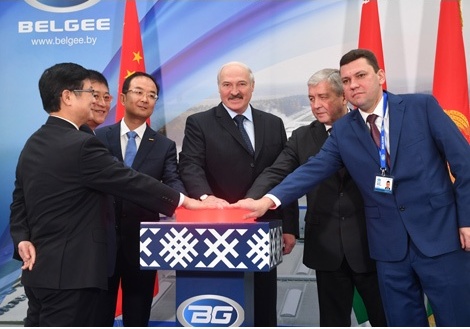 The start of CKD assembly in Belarus has become another important page in the country’s history, Belarus President Alexander Lukashenko noted at a ceremony to inaugurate the car factory on 17 November. He also remarked that his dream to manufacture a car in Belarus has come true. The production of reliable electric cars in Belarus would be the best gift for him, the president added.
The start of CKD assembly in Belarus has become another important page in the country’s history, Belarus President Alexander Lukashenko noted at a ceremony to inaugurate the car factory on 17 November. He also remarked that his dream to manufacture a car in Belarus has come true. The production of reliable electric cars in Belarus would be the best gift for him, the president added.
The Belarusian-made experimental electric car was unveiled in August. It is based on the stock car Geely SC7, which is assembled in Belarus. All the components of the electric traction drive are made in Belarus. The only thing imported was the drive battery by the Russian company Ener Z which had won the relevant tender. Instructions have been given to start producing batteries in Belarus.
Helsinki 2 and PA OSCE session
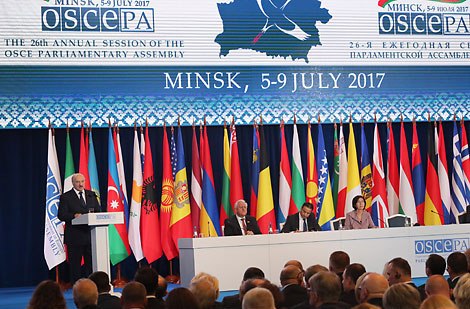 The 26th annual session of the OSCE Parliamentary Assembly was held in Minsk on 5-9 July 2017. It was the first time that Belarus hosted this large-scale international political forum.
The 26th annual session of the OSCE Parliamentary Assembly was held in Minsk on 5-9 July 2017. It was the first time that Belarus hosted this large-scale international political forum.
At a plenary meeting dedicated to the inaugural session Belarus President Alexander Lukashenko proposed the OSCE to begin the debate on the need for a new Helsinki process, so-called Helsinki 2.
The Belarusian leader took note of the need to renew the pan-European dialogue on measures to strengthen trust, security and cooperation. “This should be done bearing in mind the enormous positive experience associated with the Helsinki Process of the 1970s that showed that the actions should be proactive, rather than reactive. All this points to the relevance of the idea to launch a new Helsinki Process, a broad dialogue aimed at overcoming the existing differences in the relations between the countries in our Euro-Atlantic and Eurasian region, the Belarusian leader said.
Secretary General of the OSCE Parliamentary Assembly Roberto Montella welcomed Belarus' proposal to start discussing the need to launch a new Helsinki process. He also expressed satisfaction with the level of the event organization in Minsk and said: “Minsk is turning into an international center for the settlement of political issues and other aspects. Belarus is the bridge between the East and the West.”
The Minsk Declaration was adopted at the OSCE PA annual session in the Belarusian capital. The Minsk Declaration is based on the resolutions adopted following the discussions. Belarus suggested a resolution on the development of timely and effective legislative, regulatory and administrative measures in response to the emergence of new psychoactive substances. The document was supported by the OSCE MPs and made part of the Minsk Declaration. Besides, the Belarusian side co-sponsored several resolutions developed by foreign counterparts. These documents relate to the fight against terrorism (Russia), problems of intolerance and discrimination on religious grounds (Russia), prevention of sexual exploitation of children on the Internet (the United States), the issues of democratic development of the multiculturalism values (Azerbaijan). All of them were included in the final document of the 26th PA OSCE Summer Session.
Big Conversation with the President
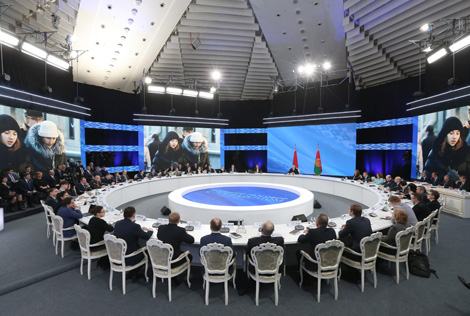 In early February Belarus President Alexander Lukashenko held a meeting with members of the public and the media. It lasted for 7 hours 20 minutes.
In early February Belarus President Alexander Lukashenko held a meeting with members of the public and the media. It lasted for 7 hours 20 minutes.
The meeting was attended by about 50 journalists representing the biggest state-run and corporate Belarusian media outlets, popular websites, and major foreign mass media. Numerous experts, including famous political analysts, economists, and representatives of political parties, religions, and public associations were also invited, which made the meeting even more topical and productive.
The meeting, which was held under the title “The Big Conversation with the President” justified its name from the first minutes. The head of state said that there were no closed topics and that he would like to discuss the problems that concern the people of Belarus and to hear the views of all those present.
The discussion covered several dozen themes, including the foreign policy of Belarus, the country's social and economic development over the past year, the death penalty, the security, the tourism potential of the state, the construction of the NPP in Belarus and many others.
500 Years of Belarusian Book Printing
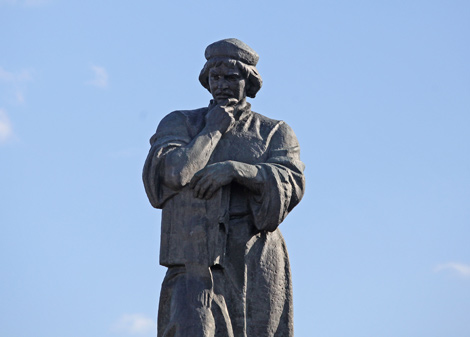 The Bible in the ancient Belarusian language came out in Prague on 6 August 1517. The Psalter was published by Francysk Skaryna from Polotsk. This date is considered the birthday of the Belarusian book printing, the 500th anniversary of which was celebrated in 2017.
The Bible in the ancient Belarusian language came out in Prague on 6 August 1517. The Psalter was published by Francysk Skaryna from Polotsk. This date is considered the birthday of the Belarusian book printing, the 500th anniversary of which was celebrated in 2017.
The Francysk Skaryna bible became the first printed book of the Eastern Slavs. It came out earlier than the English and French translations, almost 50 years ahead of The Apostle published in the Moscow printing house. It was the scientific, spiritual and educational breakthrough.
The date of the 500th anniversary of the Belarusian printing has a global significance and was included in the UNESCO calendar of historic events. Belarus held a number of events to honor this historical event.
Ahead of the anniversary date the Belarusian National Library presented a large-scale project: a 21-volume facsimile edition “The Book Heritage of Francysk Skaryna”. This is the collection of the books printed by Francysk Skaryna in Prague (1517-1519 ) and Vilna (1522-1525).
The bulk of the facsimile sets will remain in Belarus. Some part was donated to the leading Russian libraries, museums and archives, libraries of France, Poland, Latvia, the Czech Republic, the UK, Austria, Germany, Belgium, to the UN Library and the library of the University of Berne.
Minsk, EOC sign 2019 European Games contract
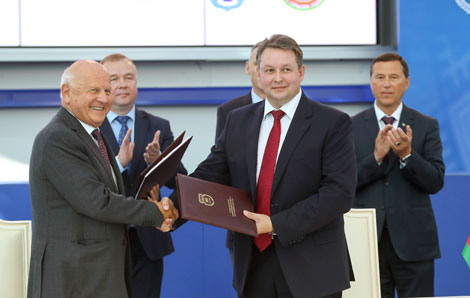 Minsk and the Executive Committee of the European Olympic Committees (EOC) signed a contract on holding the Second European Games in 2019. The signing ceremony took place at the National Olympic Committee (NOC) of Belarus on 1 September.
Minsk and the Executive Committee of the European Olympic Committees (EOC) signed a contract on holding the Second European Games in 2019. The signing ceremony took place at the National Olympic Committee (NOC) of Belarus on 1 September.
The competition program includes 15 sports: badminton, 3x3 basketball, boxing, wrestling (freestyle, Greco-Roman, and women's), cycling (track and road), gymnastics (artistic, rhythmic, acrobatics, aerobics, trampolining), canoeing and kayaking, judo, karate, athletics, sambo, archery, shooting sports, table tennis, and beach soccer. 189 medals events will be held in 23 sport disciplines.
Several sport disciplines will be held as qualifiers for the 2020 Summer Olympic Games. These are badminton, boxing, cycling, canoeing and kayaking, judo, karate, athletics, archery, shooting, and table tennis.
Belarus was chosen to host the Second European Games in 2019 after a vote at the 45th General Assembly of the European Olympic Committees in Minsk in October 2016. The Belarusian capital is expected to host more than 4,000 athletes for the Second European Games.
Belarus’ debut in the Fed Cup final
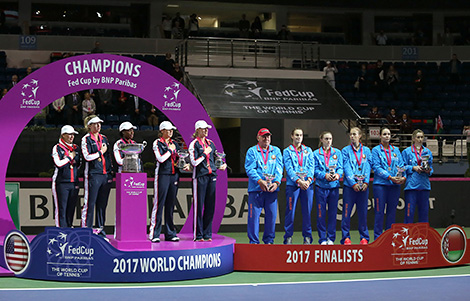 Belarus played their maiden Fed Cup final, after beating the Netherlands (4-1) and Switzerland (3-2) this season.
Belarus played their maiden Fed Cup final, after beating the Netherlands (4-1) and Switzerland (3-2) this season.
The Belarus vs the United States Fed Cup final held in Chizhovka Arena, Minsk, on 11-12 November was a sell-out.
The United States squad included Coco Vandeweghe, Sloane Stephens, Shelby Rogers and Alison Riske. The Belarusian national team comprized Arina Sobolenko, Aleksandra Sasnovich, Vera Lapko and Lidia Morozova.
On the first day of the Fed Cup final, 11 November, world number ten Coco Vandeweghe defeated Aleksandra Sasnovich 6-4, 6-4, before Belarus' Arina Sobolenko proved too strong for Sloane Stephens, 6-3, 3-6, 6-4. On 12 November Coco Vandeweghe beat Arina Sobolenko 7-6 (7-5), 6-1 while Aleksandra Sasnovich defeated Sloane Stephens 4-6 6-1 8-6 in a thrilling match to force a decider.Coco Vandeweghe and Shelby Rogers beat Arina Sobolenko and Aleksandra Sasnovich 6-3 7-6 (7-3) in the deciding doubles rubber to give the visitors a 3-2 win.


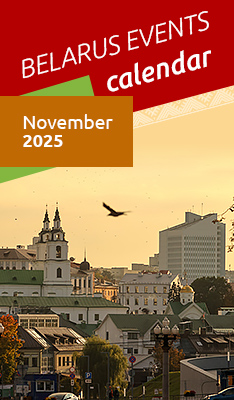




 print version
print version make home page
make home page add to bookmarks
add to bookmarks

